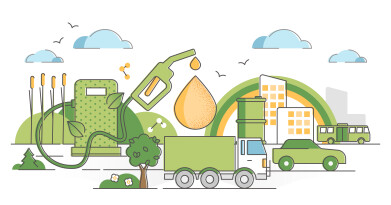Biofuel industry news
UK councils are choosing vegetable oil to power waste collection
Oct 03 2024
British councils are increasingly turning to Hydrotreated Vegetable Oil (HVO) as a practical and environmentally friendly alternative to diesel for powering their waste collection fleets. HVO, which is derived from vegetable oils and waste fats, provides up to a 90% reduction in carbon dioxide emissions compared to traditional diesel, making it an attractive option for councils aiming to reduce their carbon footprints. This shift reflects the broader movement towards sustainability as councils work to meet national and local climate goals.
Hyndburn Council in Lancashire is among the latest to adopt HVO-powered vehicles. The council has introduced five new waste collection lorries fueled by this cleaner alternative, as part of their broader efforts to achieve net-zero emissions by 2030. Councillor Stewart Eaves, responsible for environmental services, emphasized how this transition supports the council’s environmental objectives. In addition to these new vehicles, the council has also rebranded two existing bin lorries to promote a free bulky waste collection service, which helps residents dispose of larger household items such as furniture and white goods.
The move towards HVO is gaining traction across the UK. Cumberland Council has also launched a six-month trial of HVO-powered waste lorries in Whitehaven, anticipating a significant reduction in carbon emissions over the period. Similarly, East Cambridgeshire District Council has committed £2 million to fund 10 new HVO-powered vehicles, with the goal of becoming carbon-neutral by 2040. These councils recognize that waste collection vehicles are among the largest contributors to local authority emissions, and the switch to HVO offers an immediate, impactful solution.
HVO is seen as a cost-effective and logistically feasible alternative to electric or hydrogen-powered waste lorries. Unlike electric vehicles, which can be costly and require substantial infrastructure, HVO can be used as a direct replacement for diesel in existing fleets with minimal modifications. This has made it particularly appealing for councils like Bedford, where electric waste vehicles have been deemed unsuitable for rural areas due to limited range. Paul Pace, Bedford’s Chief Officer for Environment, noted that HVO’s low upfront costs and compatibility with current infrastructure make it a more viable option for now.
However, concerns have been raised about the sustainability of HVO. While some of the fuel is produced from genuine waste products, such as used cooking oil, there is growing reliance on palm oil-derived HVO, which has been linked to deforestation in Southeast Asia. Councillors like Bedford’s Hilde Hendrickx have pointed out that HVO should be viewed as a transitional solution rather than a long-term fix. The ultimate goal, she argues, is to move towards electric or hydrogen-powered vehicles as the technology becomes more accessible and affordable.
Despite these challenges, HVO offers a promising interim solution for councils looking to reduce emissions without overhauling their entire fleet or investing heavily in new infrastructure. In addition to cutting emissions, HVO is fully biodegradable, providing an environmentally safer option should any leaks or spills occur. As more councils adopt HVO-powered vehicles, this shift highlights the importance of innovation and flexibility in addressing the climate crisis.
While HVO is not without its drawbacks, the switch to vegetable oil-powered waste lorries marks a significant step towards achieving cleaner and greener local services. Councils like Hyndburn, Cumberland, and East Cambridgeshire are setting an example for how local authorities can contribute to national and global climate goals through thoughtful, practical changes in everyday operations. As more councils explore this option, the hope is that it will accelerate progress toward a more sustainable future.
Digital Edition
PIN 25.6 Buyers' Guide
January 2025
Buyers' Guide Directory - Product Listings by Category - Suppliers Listings (A-Z) Articles Analytical Instrumentation - ASTM D7042: The Quantum Leap in Viscosity Testing Technology -...
View all digital editions
Events
SPE Hydraulic Fracturing Technology Conference and Exhibition
Feb 04 2025 The Woodlands, TX, USA
Feb 05 2025 Guangzhou, China
Trinidad and Tobago Energy Conference 2025
Feb 10 2025 Point Lisas, Trinidad
Feb 11 2025 Lagos, Nigeria
Feb 13 2025 Manama, Bahrain



















